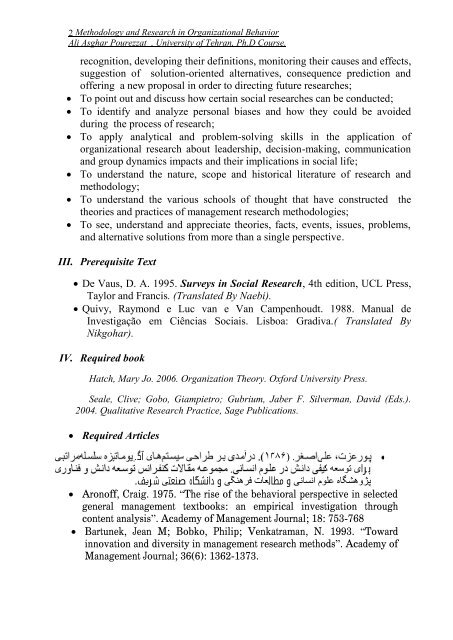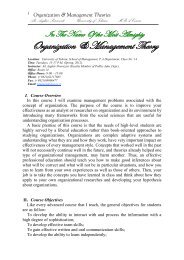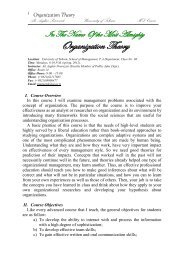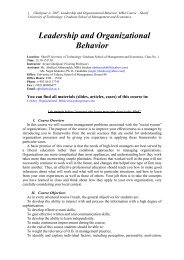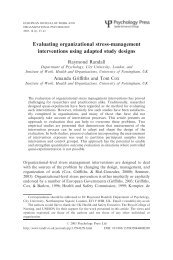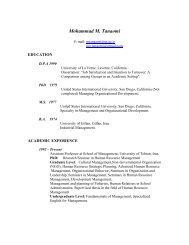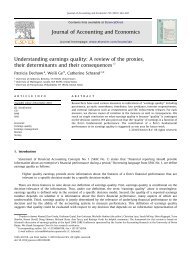Methodology and Research in Organizational Behavior
Methodology and Research in Organizational Behavior
Methodology and Research in Organizational Behavior
Create successful ePaper yourself
Turn your PDF publications into a flip-book with our unique Google optimized e-Paper software.
2 <strong>Methodology</strong> <strong>and</strong> <strong>Research</strong> <strong>in</strong> <strong>Organizational</strong> <strong>Behavior</strong><br />
Ali Asghar Pourezzat , University of Tehran, Ph.D Course.<br />
recognition, develop<strong>in</strong>g their def<strong>in</strong>itions, monitor<strong>in</strong>g their causes <strong>and</strong> effects,<br />
suggestion of solution-oriented alternatives, consequence prediction <strong>and</strong><br />
offer<strong>in</strong>g a new proposal <strong>in</strong> order to direct<strong>in</strong>g future researches;<br />
To po<strong>in</strong>t out <strong>and</strong> discuss how certa<strong>in</strong> social researches can be conducted;<br />
To identify <strong>and</strong> analyze personal biases <strong>and</strong> how they could be avoided<br />
dur<strong>in</strong>g the process of research;<br />
To apply analytical <strong>and</strong> problem-solv<strong>in</strong>g skills <strong>in</strong> the application of<br />
organizational research about leadership, decision-mak<strong>in</strong>g, communication<br />
<strong>and</strong> group dynamics impacts <strong>and</strong> their implications <strong>in</strong> social life;<br />
To underst<strong>and</strong> the nature, scope <strong>and</strong> historical literature of research <strong>and</strong><br />
methodology;<br />
To underst<strong>and</strong> the various schools of thought that have constructed the<br />
theories <strong>and</strong> practices of management research methodologies;<br />
To see, underst<strong>and</strong> <strong>and</strong> appreciate theories, facts, events, issues, problems,<br />
<strong>and</strong> alternative solutions from more than a s<strong>in</strong>gle perspective.<br />
III. Prerequisite Text<br />
De Vaus, D. A. 1995. Surveys <strong>in</strong> Social <strong>Research</strong>, 4th edition, UCL Press,<br />
Taylor <strong>and</strong> Francis. (Translated By Naebi).<br />
Quivy, Raymond e Luc van e Van Campenhoudt. 1988. Manual de<br />
Investigação em Ciências Sociais. Lisboa: Gradiva.( Translated By<br />
Nikgohar).<br />
IV. Required book<br />
Hatch, Mary Jo. 2006. Organization Theory. Oxford University Press.<br />
Seale, Clive; Gobo, Giampietro; Gubrium, Jaber F. Silverman, David (Eds.) .<br />
2004. Qualitative <strong>Research</strong> Practice, Sage Publications.<br />
<br />
Required Articles<br />
ی آگزی<br />
ی سی ی ی<br />
ی.<br />
برای توسعھ کیفی<br />
پژوھشگاه علوم انسانی و مطالعات فرھنگی و دانشگاه صنعتی شریف.<br />
ی<br />
ی<br />
ی<br />
<br />
<br />
.(١٣٨۶) .<br />
Aronoff, Craig. 1975. “The rise of the behavioral perspective <strong>in</strong> selected<br />
general management textbooks: an empirical <strong>in</strong>vestigation through<br />
content analysis”. Academy of Management Journal; 18: 753-768<br />
Bartunek, Jean M; Bobko, Philip; Venkatraman, N. 1993. “Toward<br />
<strong>in</strong>novation <strong>and</strong> diversity <strong>in</strong> management research methods”. Academy of<br />
Management Journal; 36(6): 1362-1373.


